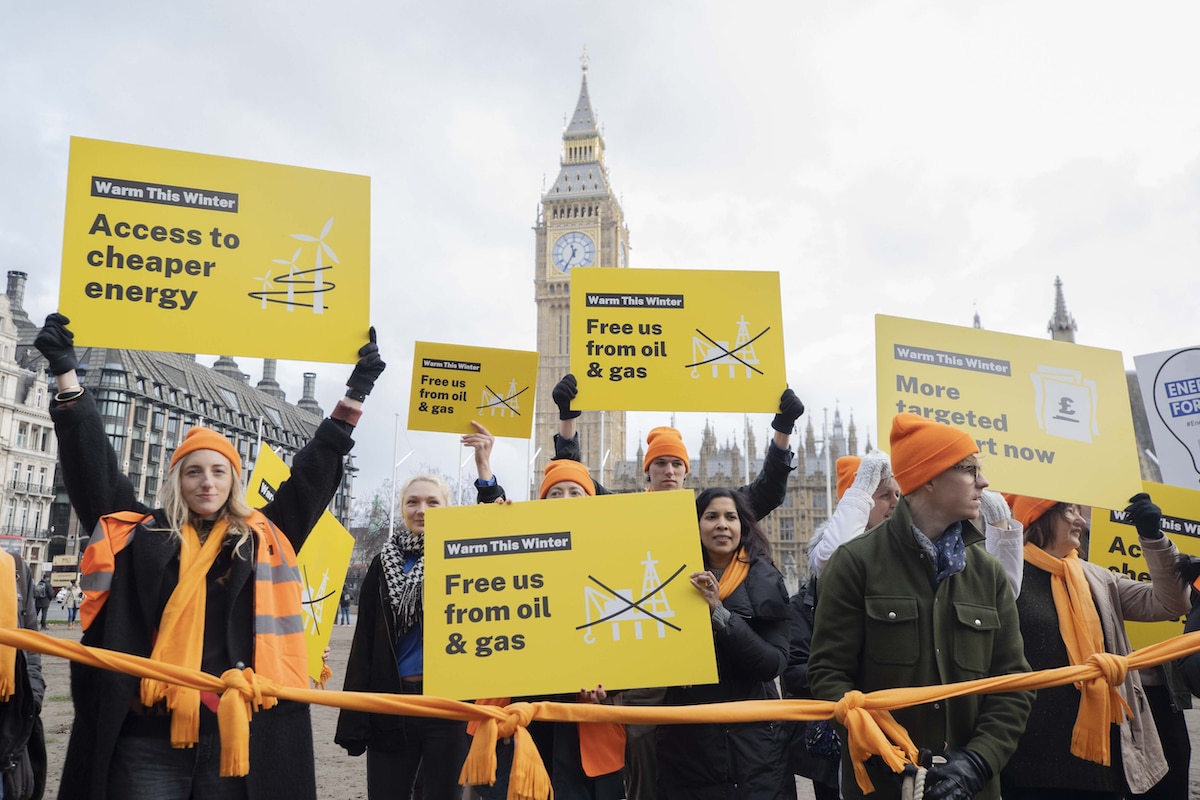Products You May Like
A group gathered to protest energy bills in London on Dec. 3, 2022. Rasid Necati Aslim / Anadolu Agency via Getty Images
 Why you can trust us
Why you can trust us
Founded in 2005 as an Ohio-based environmental newspaper, EcoWatch is a digital platform dedicated to publishing quality, science-based content on environmental issues, causes, and solutions.
UK residents should not expect their gas and electric bills to return to pre-pandemic levels, the chief executive of one of Europe’s largest energy companies told the BBC in a widely reported interview.
Speaking ahead of the World Economic Forum, which began Monday in Davos, Equinor leader Anders Opedal said that both the energy crisis sparked by Russia’s invasion of Ukraine and the global response to the climate crisis had fundamentally altered the status quo.
“We have seen a rewiring of the whole energy system of Europe,” Opedal told BBC Radio 4’s Today programme, as The Guardian reported. “We need more renewables. This will require a lot of investment and these investments need to be paid for. I would assume energy bills will [ultimately] be slightly higher than in the past but not as volatile as today.”
More From EcoWatch
Gas prices began to rise following the end of the coronavirus lockdowns and then shot up further following Russia’s invasion of Ukraine and the subsequent reduction of gas supplies to Europe, BBC News explained. The UK was especially vulnerable to the impacts of this spike because it depends on gas for a larger share of its energy supply than other European countries. Around 85 percent of homes are heated with gas boilers and around 40 percent of its electricity comes from gas, according to the London School of Economics. At the same time, its homes are comparatively poorly insulated.
In the winter of 2021, the average yearly energy bill in the country was around £1,000. This would have risen to more than £3,500 in October 2022 without government intervention. As it stands, with government aid the annual average bill is currently £2,500 a year and will jump again to £3,000 in April, according to The Guardian.
While gas prices at the moment have dipped to pre-invasion levels, partly because of warmer than expected weather, household and business gas and electricity bills are still high, BBC News noted. Opedal said it was unlikely that they would return an earlier average of £1,300 a year. Instead, he called for a shift in how energy is viewed.
“I think we need to treat energy as something that is not abundant. It actually has a value,” Opedal told BBC’s Today program, as the Press Association reported. “I think we’ve had a lot of cheap energy in the past and we’ve probably wasted some of it. So, to make sure that we are making the right investments everyone wants to use as little energy as possible.”
While Opedal said that financing the transition to renewable energy would raise bills, other climate experts have argued that high energy prices are the consequence of relying on imported fossil fuels instead of domestic renewable energy.
“While climate contrarians attempt to pin soaring energy bills on the ‘cost of net zero,’ in reality these crippling prices are, along with escalating climate impacts and Putin’s cynical despotism, the cost of not zero,” Energy and Climate Intelligence Unit senior associate Richard Black wrote for Climate Home News.
The Norwegian-based Equinor makes most of its profits from oil and gas, according to BBC News. It itself has not suffered during the energy crisis, reporting record profits due to high prices alongside other major fossil fuel companies. It made $24.3 billion before taxes between July and September of 2022, up $9.7 billion during the same period in 2021.
Subscribe to get exclusive updates in our daily newsletter!
By signing up, you agree to the Terms of Use and Privacy Policy & to receive electronic communications from EcoWatch Media Group, which may include marketing promotions, advertisements and sponsored content.
